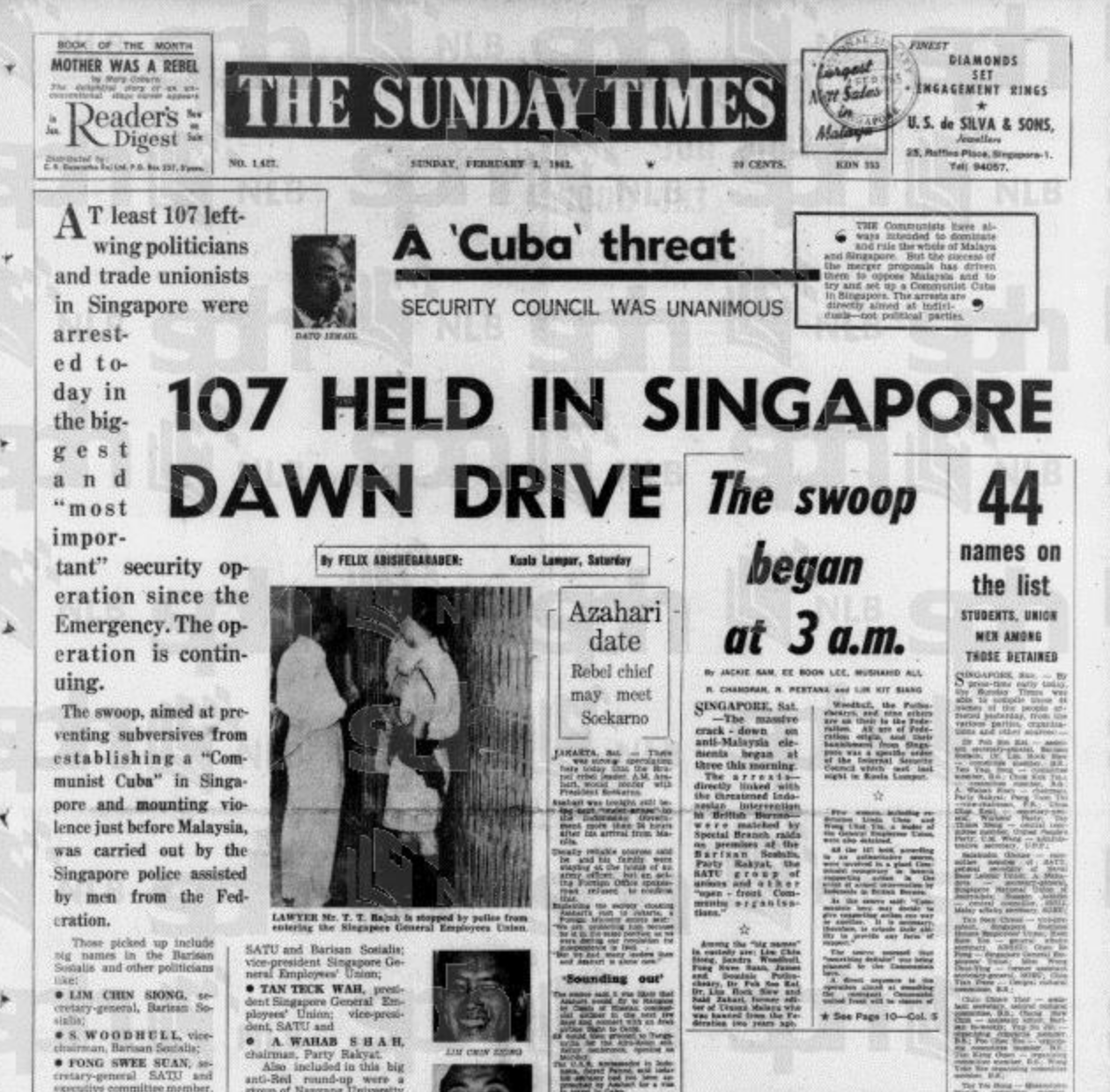Still in Mist: 1963 Operation Coldstore in Singapore
Over time, the perspective on Operation Coldstore has undergone significant shifts, both within Singapore and internationally.
Introduction
Operation Coldstore (冷藏行動) was a significant event in the history of Singapore, occurring in 1963, during a period of intense political instability and tension. It was a large-scale crackdown orchestrated by the Singaporean government under the leadership of Prime Minister Lee Kuan Yew (李光耀) and the People’s Action Party (PAP). The operation resulted in the arrest of over one hundred individuals, mainly members of the left-wing opposition parties, trade unions, and pro-communist groups. The operation marked a pivotal moment in the country’s path to independence and its efforts to suppress communist influence in the region.
Context and Background
Singapore, in the early 1960s, was in a period of political and social upheaval. It had just gained self-government in 1959 under British colonial rule and was moving towards full independence. The country’s political landscape was highly polarized, with growing tensions between the pro-communist factions and those who supported the Western-backed government.
In 1961, Singapore joined the Federation of Malaysia, a move aimed at strengthening the country’s political and economic position. However, there was significant opposition within Singapore to this merger, particularly from pro-communist groups, who believed that Singapore's interests would not be adequately represented in the new federation. This opposition was reflected in both the trade unions and opposition parties, notably the Barisan Sosialis (社會主義陣線), led by Lee Siew Choh (李紹祖) and Lim Chin Siong (林清祥), which was formed by former members of the PAP’s (人民行動黨) left-wing faction.
Since its formation, the PAP was divided into the conservative-technocratic Lee Kuan Yew camp and the left-wing camp led by Lim Chin Siong. As tensions escalated, the Singapore government, led by Lee Kuan Yew’s PAP, saw the rise of communism as a threat to the stability of the country and its young independence. The operation was part of the broader effort to eliminate perceived communist influence within Singapore’s political, social, and labor movements.
Operation Coldstore: The Crackdown
On the night of February 2, 1963, the Singapore government launched Operation Coldstore. This operation involved the arrest of over one hundred individuals, many of whom were associated with left-wing political movements, trade unions, and organizations suspected of being communist. Key leaders of the opposition party Barisan Sosialis, including its leader Lim Chin Siong, were among those arrested. Other prominent figures included labor leaders, students, and activists linked to left-wing ideologies.
The government justified the arrests by arguing that the individuals involved were conspiring to overthrow the government and were working in conjunction with communist sympathizers in Malaysia and China. The government claimed that the individuals arrested were involved in a network that aimed to destabilize Singapore’s newly formed political order, which was built on the leadership of the PAP.
The arrests were carried out under the Internal Security Act (ISA/內部安全法), a law that gave the government the power to detain individuals without trial if they were deemed a threat to national security. Many of those arrested were held for extended periods without formal charges or trials, sparking widespread criticism from human rights organizations and international observers.
Impacts Inside and Outside of Singapore
The public was shocked by the government’s ability to suppress its political opponents. However, the arrests had a long-term impact on the political landscape of Singapore. The arrests significantly weakened the opposition forces, resulting in the divide of the Barisan Sosialis as key members from the trade unions shifted away from the active opposition.
Internationally, Operation Coldstore received criticism from various quarters, including the British press, which questioned the legality and fairness of the arrests having constituted serious violations of human rights. However, Western governments, including the UK and the US, largely supported Lee Kuan Yew’s government, as they shared concerns about the growing influence of communism in Southeast Asia during the Cold War.
For Lee Kuan Yew and the PAP, Operation Coldstore cemented their grip on power. By neutralizing the communist threat and suppressing left-wing opposition, the PAP ensured that its position as the dominant political party in Singapore remained unchallenged. The operation also strengthened Singapore’s relationship with Malaysia and other anti-communist nations, such as the Republic of China (Taiwan) in the region.
Shift of Historical Viewpoint
Over time, the perspective on Operation Coldstore has undergone significant shifts, both within Singapore and internationally. The historical view of the operation has evolved as different generations of Singaporeans and scholars reflect on its impact, the political climate of the time, and the consequences for the nation.
Keep reading with a 7-day free trial
Subscribe to Consequence to keep reading this post and get 7 days of free access to the full post archives.



